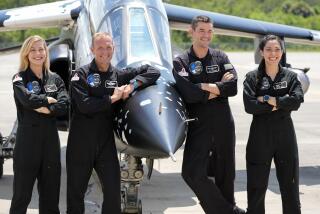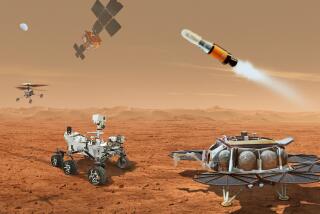Commentary : Progress Means Accepting Risks
- Share via
The tragic loss of Space Shuttle Mission 51-L on Jan. 28 has raised the issue of risk versus benefit.
I was appointed director of the Office of Manned Space Flight Safety for the National Aeronautics and Space Administration after the loss of astronauts Roger B. Chaffee, Edward H. White and Virgil I. (Gus) Grissom when an explosion occurred in their capsule during a test program on Jan. 27, 1967.
In early 1969, as we were approaching the first successful Apollo launch to the moon, I was criticized for not proposing that rescue facilities be provided in case the mission got into trouble. I replied, in essence, that every test pilot is prepared for the eventuality of failure.
The Apollo astronauts were fully aware of the hazards and uncertainties that might befall them on the mission to the moon and had knowingly agreed to accept the risks.
I then compared the Apollo project to Christopher Columbus crossing the Atlantic (in the hurricane season with leaking ships). I also compared it with the solo flight of Charles Lindbergh from New York to Paris, a venture which the operating philosophy of NASA would not have permitted because of its dangers. I sent a copy of my response to Lindbergh. He replied, on March 16, 1969, that “I have always felt that risk should be related to objective” and agreed with the philosophy I had presented.
It is obvious that the world has profited enormously from Columbus’ discovery of America. And that Charles Lindbergh’s successful flight brought on a phenomenal surge of interest in aviation with incalculable profit to society in the development of the safest form of transportation. It also had spinoffs in general aviation, such as crop spraying, power-line patrol, highway patrol, exploration and scores of other benefits.
Before Lindbergh, risks were taken by the Wright Brothers and many other pioneers. During the operation of the U.S. Air Mail Service, the world’s first permanent system of scheduled air transportation that set the pattern for our present magnificent system of air transportation, one in every six airmail pilots was killed. The life expectancy of an airmail pilot was three years. They knew the risks and embraced them.
The same is true of the astronauts who lost their lives last month. To stop space ventures because of that tragedy would be an insult to their memory. Risks must be accepted if society is to progress.
The benefits to society from space are evident everywhere: in communications, medicine and industry.
We routinely watch TV to observe events in Asia, Europe or Latin America in real time via satellites developed by the space program. Weather forecasting, crop surveys, the discovery of new natural resources (oil, coal, ores) and the detection of forest fires are some of the other common areas that were improved by the space program.
Many medical benefits have resulted from space. The ability of a blind person to read without using Braille and the use of scans and ultrasonic devices in hospitals to detect abnormalities in the body are but a few of the hundreds of medical spinoffs of the space program.
The industrialization of space, to be made possible by the shuttle, will provide medications and material which cannot be made as well on earth as in a zero gravity environment. These include optical lenses, crystals for electronic use and ball bearings. We are on the threshold of a multibillion dollar industrial revolution because of the industrialization of space and because of the special demands for space hardware created by the restrictions of weight, space, energy, reliability and safety, which are at a premium in space. Pocket calculators, pocket-sized radios, digital watches, even heart pacemakers, represent these spinoffs.
The father of America’s rocketry, Robert H. Goddard, in 1904 declared: “It is often proved true that the dawn of yesterday is the hope of today and the reality of tomorrow.”
While arguing for funds to support Goddard’s rocket research, Lindbergh said: “It’s taking a chance, but if we’re ever going to get beyond the limits of airplanes and propellers we’ll probably have to go to rockets. It’s a chance, yes, but I think it’s worth taking!”
I believe that NASA will find the cause of the tragedy, correct it, and go on to greater achievements in flights that will be as safe as technology can possibly make them. It must do that if we are to retain our prestige--politically and technically--and keep faith with the astronauts who lost their lives.
More to Read
Sign up for Essential California
The most important California stories and recommendations in your inbox every morning.
You may occasionally receive promotional content from the Los Angeles Times.













